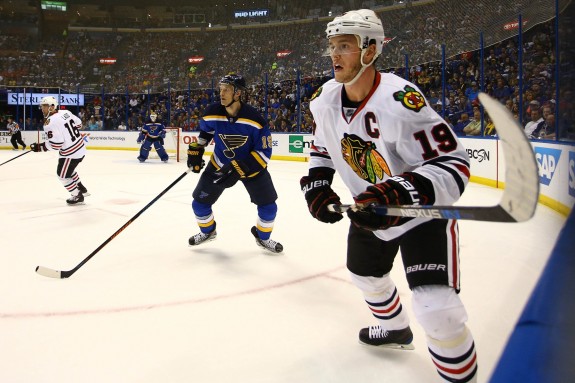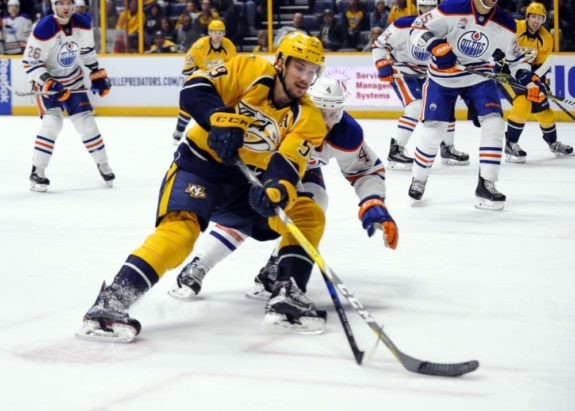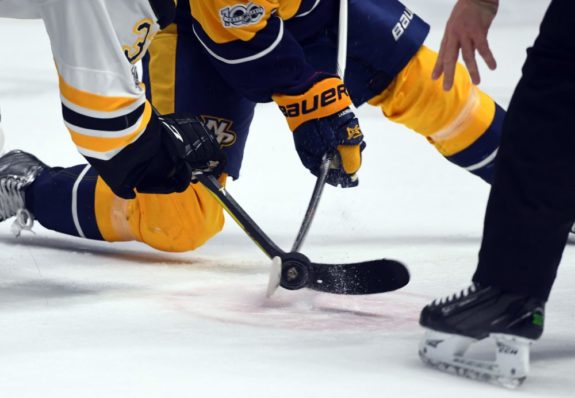As we sit here on the eve of the 2017 Stanley Cup Playoffs, you’ve probably been reminded that the Nashville Predators are a familiar first-round foe for the Chicago Blackhawks. Chicago and Nashville have met twice in the postseason – 2010 and 2015 – both of which resulted in 4-2 series victories and eventual Stanley Cup championships for the Blackhawks. Fans and prognosticators, as well as the team itself, appear confident the Blackhawks will once again send the Predators into the off-season.
I’m not hear to tell you otherwise. For all of the obvious reasons – the Blackhawks’ elite talent, depth, health, and intangibles – my voice is among the chorus of predictions that the Blackhawks will advance to the Western Conference Semifinals. I do believe, though, the Predators have the potential to give the Blackhawks problems. I say that not only because of what Nashville brings to the rink (speed, scoring ability, and good center play), but more so due to some of the Blackhawks’ shortcomings over the course of the regular season.
Special Teams

“Both of our special teams can be better and they have to be better down the stretch and in the playoffs if we want to keep playing for a long time this postseason,” captain Jonathan Toews said. “Penalty kill is a big part of that. Obviously we had some great goaltending across the board but there’s always room for improvement.” – Chris Hine/Chicago Tribune Column
The Blackhawks’ special teams play has been anything but special throughout the course of the 2016-17 season. Both units rank in the bottom half of the league. Chicago’s 18 percent conversion rate on the power play was only good for 19th, while the penalty kill unit’s success rate of 78 percent was even worse, ranking 24th. Compounding the power play unit’s pedestrian performance was that the team didn’t generate that many chances. The Blackhawks’ 233 power play attempts were the eight fewest among all teams. On the kill, something else stood out. The Blackhawks only scored one short-handed goal all season, dead last among the entire league. And speaking of short-handed goals, who could forget:
The news isn’t all bad. One key component of the Blackhawks’ season was their ability to stay out of the penalty box. Chicago logged the second fewest penalty minutes and kill attempts in the entire league, a trend that I think must continue if this team is to make a deep playoff run. It should also be good news for the Blackhawks that the Predators special teams units are nothing to write home about. Their power play and penalty kill units ranked 16th and 15th respectively. One element of caution: Nashville does have a knack for finding the back of the net when they are a man down. Their 12 short-handed goals were the most in the National Hockey League.

While each season stands on its own, what strikes me the most is that none of the Blackhawks teams that won the franchise’s three modern-day Stanley Cups had a combination of special teams units that were this mediocre. Each of those Cup-winning teams had a top-five special teams unit in the regular season – the penalty kill in 2010 and 2013 and the power play in 2015. Interestingly enough, though, is that in each of those years the non-dominant special teams units were ranked in the bottom half of the league.
So, is meddling special teams play prohibitive to a deep playoff run? Not necessarily. But it can certainly keep games and series closer than they should be.
Face-Offs

The Blackhawks have been a poor face-off team all year, winning only 47.5 percent of their draws. Only the Edmonton Oilers were worse. Other than the always-reliable Jonathan Toews, who won 55 percent of his face-offs, the Blackhawks’ other regular centers lost over half their draws. The combined face-off production of Kruger (49 percent), Anisimov (45 percent), and Kero (44 percent) was underwhelming and may not be adequate against some of the teams with strong center play. Nashville is one of those teams, eighth best in face-off wins over the course of the season. If Chicago doesn’t find a way to narrow this gap against their first-round opponent, it will most certainly create additional offensive-zone chances for the Preds and limit the same for themselves.
One player to keep an eye on in this regard could be Andrew Desjardins. He was one of the players caught up in the fourth line carousel as head coach Joel Quenneville rotated players and tried different line combinations throughout the course of the season. If healthy (currently day-to-day with a lower body injury), he is an intriguing possibility to take some face-offs in key situations. While he only took 69 face-offs during the regular season due to being asked to play mostly left wing, he won 57 percent of those. That wasn’t necessarily a fluke. In his career with San Jose and Chicago, Desjardins has taken over 1,600 face-offs and won 54 percent. He’s capable and might get called upon.

Face-offs have to be the most concerning area of the Blackhawks game this year. Their previous championship clubs were strong face-off teams, two of which – 2010 and 2015 – ranked in the top five. The 2013 team was 11th best. The Blackhawks will have to find some improvement at the dot to hoist their fourth Cup in eight years.
What Else Stands Out?
Special teams and face-off improvement will have my eye more than anything else as the Blackhawks embark on their ninth consecutive postseason. But, something else strikes me about the 91st iteration of the Chicago Blackhawks: this team wins close games. Their 24 wins in one-goal games were the most in the NHL. Their win percentage in one-goal games was seventh best. Nashville performed poorly in one-goal games, finishing 28th and 27th in wins and win percentage respectively. While anything can happen over a small sample size, it would stand to reason that close games should clearly favor the Blackhawks.
#HawksTalk Podcast: Blackhawks keep finding ways to win close games – https://t.co/SmT7HDEdbb
@CSNBoyle and Steve Konroyd pic.twitter.com/89iEZWyHBS
— NBC Sports Chicago (@NBCSChicago) December 14, 2016
In the defensive zone, Chicago’s goaltending has been superior – 4th best save percentage compared to Nashville’s 14th best – and they certainly have a higher propensity to block shots – 9th most in the league compared to 20th for the Preds.
Last but not least, this series should boast a fast-pace, exiting brand of hockey. Both teams like to skate and push the puck, and hitting is not part of either team’s repertoire. The Blackhawks, not surprisingly, were dead last in the league in hits, while Nashville administered the 10th fewest.
Series Prediction
Are the Blackhawks vulnerable? I believe they are. More so than in any of their three Stanley Cup-winning seasons. But, do the Predators have enough to capitalize on those vulnerabilities? I don’t think they do. I’m going with the Blackhawks in 6, but they better bring their B+ or A game, or Nashville could re-write the story line.